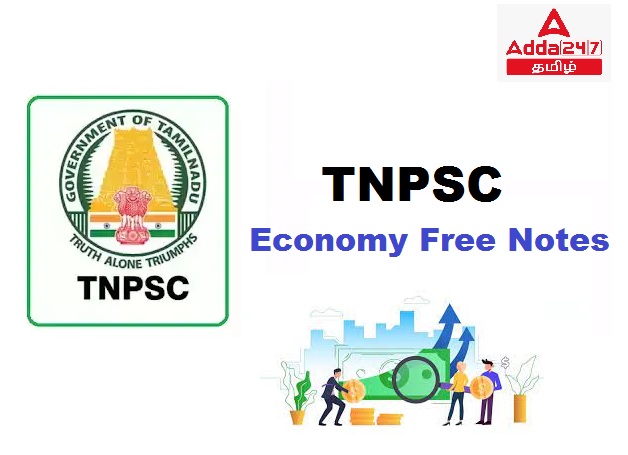இந்தக் கட்டுரையில், TNPSC குரூப் 1, குரூப் 2, குரூப் 2A, குரூப் 4 மாநிலப் போட்டித் தேர்வுகளான TNUSRB, TRB, TET, TNEB போன்றவற்றுக்கான முறைகள் இலவசக் குறிப்புகளைப் பெறுவீர்கள்.தேர்வுக்கு தயாராவோர் இங்குள்ள பாடக்குறிப்புகளை படித்து பயன்பெற வாழ்த்துகிறோம்.
ECONOMICS
Introduction
The term or word ‘Economics’ comes from the Ancient Greek word oikonomikos (oikos
means “households”; and, nomos means “management”, “custom” or “law”). Thus, the
term ‘Economics’ means ‘management of households.
The subject was earlier known as ‘Political Economy’, is renamed as ‘Economics’, in the
late 19 th century by Alfred Marshall.
Four definitions,
Each referring to stage of the growth of the subject of Economics, are presented here.
They are:
Smith’s Wealth Definition, representing the Classical era;
Marshall’s Welfare Definition, representing the Neo-Classical era;
Robbins’ Scarcity Definition, representing the New Age; and,
Samuelson’s Growth Definition, representing the Modern Age.
Wealth Definition – Adam Smith
Adam Smith (1723-1790), in his book “An Inquiry into Nature and Causes of Wealth of
Nations” (1776) defines “Economics as the science of wealth”.
He explains how a nation’s wealth is created and increased.
He considers that the individual in the society wants to promote his own gain and, in
this process, he is guided and led by an “invisible hand”.
He states that every man is motivated by his self-interest. This means that each person
works for his own good.
Smith favours the introduction of “division of labour” to increase the quantum of
output. Severe competition in factories and society helps in bettering the product.
Supply force is very active, and a commodity is made available to the consumers at the
lowest price.
The publication of Adam Smith’s “The Wealth of Nations” in 1776, has been described
as “the effective birth of economics as a separate discipline”.
Criticism
For Smith, Economics consists of ‘wealth-getting’ activities and ‘wealth-spending’
activities.
An undue emphasis is given to material wealth. Wealth is treated to be an end in itself.
This view leads him to ignore human welfare as an essential part of Economics.
Smith gives his definition when religious and spiritual values are held high.
Ruskin and Carlyle regard Economics as a ‘dismal science’, “pig science” etc. as it
teaches selfishness which is against ethics.
Welfare Definition – Alfred Marshall
Alfred Marshall (1842-1924) in his book “Principles of Economics” (1890) defines
Economics as:
“Political Economy” or Economics is a study of mankind in the ordinary business of life;
it examines that part of individual and social action which is most closely connected with
the attainment and with the use of the material requisites of well-being.
Thus, it is on one side a study of wealth; and on the other, and more important side, a
part of the study of man”.
The important features of Marshall’s definition are:
Economics does not treat wealth as the be-all and end-all of economic activities. Man
promotes primarily welfare and not wealth.
The science of Economics contains the concerns of ordinary people who are moved by
love and not merely guided or directed by the desire to get maximum monetary benefit.
Economics is a social science. It studies people in the society who influence one another.
Criticism
Marshall regards only material things. He does not consider immaterial things, such as
the services of a doctor, a teacher and so on. They also promote people’s welfare.
In the theory of wages, Marshall ignores the amount of money that goes as a reward for
the services of ‘immaterial’ services.
Marshall’s definition is based on the concept of welfare. But it is not clearly defined.
Welfare varies from person to person, country to country and one period to another.
Marshall clearly distinguishes between those things that are capable of promoting
welfare of people and those things that are not.
Things like liquor that are not capable of promoting welfare but command a price, come
under the purview of Economics.
However, welfare means happiness or comfortable living conditions of an individual or
group of people.
The welfare of an individual or nation is dependent not only on the stock of wealth
possessed but also on political, social and cultural activities of the nation.
Scarcity Definition- Lionel Robbins
Lionel Robbins published a book “An Essay on the Nature and Significance of Economic
Science” in 1932.
According to him, “Economics is a science which studies human behaviour as a
relationship between ends and scarce means which have alternative uses”.
The major features of Robbins’ definition are:
Ends refer to human wants. Human beings have unlimited number of wants.
On the other hand, resources means that go to satisfy the unlimited human wants are
limited or scarce in supply. The scarcity of a commodity is to be considered only in
relation to its demand.
Further, scarce means capable of having alternative uses.
Hence, an individual grade his wants and satisfies first his most urgent want. Thus,
Economics, according to Robbins, is a science of choice.
Criticism
Robbins does not make any distinction between goods conducive to human welfare and
goods that are not.
In the production of rice and alcoholic drink, scarce resources are used. But the
production of rice promotes human welfare, while that of alcoholic drinks does not.
However, Robbins concludes that Economics is neutral between ends.
Economics deals not only with the micro-economic aspects of resource allocation and
the determination of the price of a commodity, but also with the macro-economic
aspects like how national income is generated. But, Robbins reduces Economics merely
to theory of resource allocation.
Robbin’s definition does not cover the theory of economic growth and development.
Growth Definition – Paul Samuelson
Paul Samuelson defines Economics as “the study of how men and society choose, with or
without the use of money, to employ scarce productive resources which could have alternative
uses, to produce various commodities over time, and distribute them for consumption, now
and in the future among various people and groups of society”.
The major implications of this definition are as follows:
Like Robbins, Samuelson states that the means are scarce in relation to unlimited ends
and that such means could be put to alternative uses.
Samuelson makes his definition dynamic by including the element of time in it.
Therefore, his definition covers the theory of economic growth.
Samuelson’s definition is applicable also in a barter economy, where money is not used.
His definition covers various aspects like production, distribution and consumption.
Samuelson treats Economics as social science, whereas Robbins regards it as a science of
individual behaviour.
Of all the definitions discussed above, the ‘growth’ definition stated by Samuelson
appears to be the most satisfactory.
**************************************************************************
| Adda247 TamilNadu Home page | Click here |
| Official Website=Adda247 | Click here |




